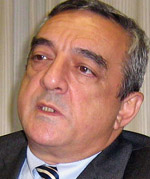One of the foreign political events of 2007 waiting to happen is the discussion of the draft declaration of the frozen conflicts at the UN General Assembly. This draft, presented by GUAM (Georgia, Ukraine, Azerbaijan, Moldova), already caused a big scandal last year. Many considered it the collective answer of GUAM to Russia which, according to them, is destabilizing the region, not to mention the gas war that has led to an unpleasant surprise and unexpected expenses.
According to UN Azerbaijani Ambassador Agshin Mehdiyev, the draft is not against Russia and isn’t getting on the nerves of Russia as some observers have noticed.
“That policy (against the country) was doomed to failure from the start. Azerbaijan’s foreign policy is based on the country’s interests and those interests may differ in different historical moments in time. As for Russia in particular, it’s not that reasonable for other countries to get on its nerves.”
My interview with the newly appointed Azerbaijani Ambassador, who was appointed on November 30, 2006, took place in the representative office at the UN central station just 50 meters away from the Rockefeller center. The picture of Ilham Aliev was above the seat which I was sitting in. In fact, no matter how strange it may sound, the Azerbaijani diplomats responded very operatively and made an appointment for the interview at an exact date and time. Of course, the interview was about the draft.
-The OSCE Minsk Group is in charge of the Nagorno-Karabakh conflict settlement. In that case, why is the UN discussing the issue?
-I see nothing wrong with that. Yes, the OSCE Minsk Group is in charge of the conflict settlement, but any international organization or structure may also be involved. That’s exactly why we have put this draft in circulation. These frozen conflicts have been going on for the past 15 years. The people and the country suffer. The conflicts must be settled and the more international organizations and structures get involved, the sooner the conflicts will be settled.
-Does Azerbaijan view the UN as an alternative to settling the conflict? ²¹ñµ»ç³ÝÁ زÎ-Á ¹Çï³ñÏáõÙ ¿ áñå»ë ѳϳٳñïáõÃÛ³Ý Ï³ñ·³íáñÙ³Ý ³ÛÉÁÝïñ³Ýù³ÛÇÝ ï³ñµ»ñ³±Ï:
-As far as I know, not at the present. The Azerbaijani government does not intend to change or move the format of the conflict settlement. Azerbaijan has always criticized the OSCE Minsk Group because the conflict should have been settled a long time ago when you have countries like the U.S., France and Russia involved.
-What do you expect to see by proposing this draft? What are you going to get out of it?
-The fact that the UN agenda includes the Nagorno-Karabakh conflict settlement draft already adds something to the negotiations process. In that sense, I think that there is some result.
-In your opinion, when will the UN General Assembly discuss the project?
-Before the end of this session, meaning during the first half of this year.
-This is not the first time that GUAM is united as one at the UN. Is it possible to see GUAM form a new political alliance within the framework of the UN?
-An alliance is a little relative and is open to interpretation. But it’s a fact that GUAM is a functioning regional alliance and works effectively. Broadening of projects and cooperation is possible in the future.
According to the Azerbaijani Ambassador to the UN, the Nagorno-Karabakh conflict settlement is the most important issue for Azerbaijan this year and the Azerbaijani diplomats are going to focus on that. Observers state that the junior Aliev is leading extremely aggressive foreign politics towards that. In fact, there is a special section dedicated to Armenia on the UN Azerbaijani web site and the page is called “Armenian aggression”.
Let’s not forget to mention that last year, Armenian diplomats were accused of not counterattacking the Azerbaijani diplomatic aggression. In reality, it’s totally different.
You may read our interview with Armenian Ambassador to the UN Armen Martirosyan about behind-the-curtain negotiations, political groupings and the infamous resolution in the next edition of “168 Hours”.

